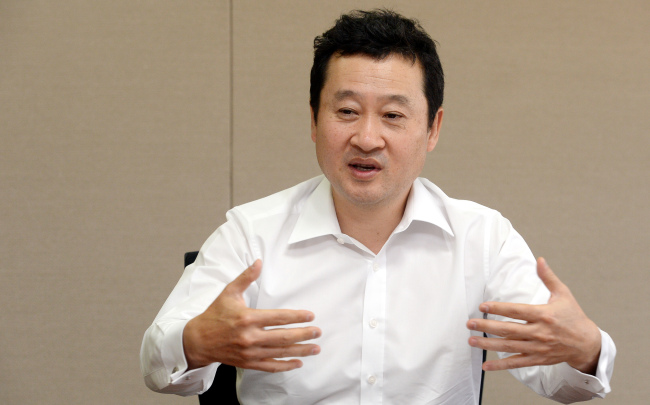[Herald Interview] Why we should care about Chinese real estate prices
Former Wall Street strategist warns of Chinese property bubble
By Korea HeraldPublished : June 3, 2014 - 21:08
Let’s go back in time to the early 2000s and say you have $1 million to invest in either a fully developed or an emerging market. what would you choose?
Many would opt for the emerging market, with the rationale being that investing in a rapidly developing market would generate quick and high returns.
But betting on a fast-growing part of the world has actually led to losses for many over the past years because of the constant high risks associated with rapid economic growth, according to renowned former Wall Street strategist David Chon.
“Fast growth does not automatically mean profit,” Chon said in an interview with The Korea Herald.
Chon returned to Korea around two years ago after spending nearly two successful decades working on Wall Street. Sitting in his office in Yeouido, where he now works as co-CEO and chief investment officer of KDB Asset Management, he said the biggest risk that Korea and other economies are facing is China’s growth slowdown.
Many would opt for the emerging market, with the rationale being that investing in a rapidly developing market would generate quick and high returns.
But betting on a fast-growing part of the world has actually led to losses for many over the past years because of the constant high risks associated with rapid economic growth, according to renowned former Wall Street strategist David Chon.
“Fast growth does not automatically mean profit,” Chon said in an interview with The Korea Herald.
Chon returned to Korea around two years ago after spending nearly two successful decades working on Wall Street. Sitting in his office in Yeouido, where he now works as co-CEO and chief investment officer of KDB Asset Management, he said the biggest risk that Korea and other economies are facing is China’s growth slowdown.

“The biggest imbalance in the world’s economy today is in China,” he said.
The world’s second-largest economy has recently been showing signs of stalling following a rapid ascent, and due to the slowdown South Korea’s exports to China slid 9.4 percent in May compared to a year earlier to record the sharpest drop since August 2009, related data showed.
Of particular concern, Chon noted, is the slowdown in the Chinese real estate market.
China had about 6.6 billion square meters of new residential space under construction as of end-2013, which is about 10 times the entire floor space of Seoul.
Citing the construction boom, he said the problem with the monstrous real estate bubble is that China’s financial system, industrial activities and economic growth all depend on the property sector.
“When you depend on leverage to generate growth, you need more leverage to keep growing. China had done that for six years,” he said. The problem with growth that depends on leverage is that it is finite and at some point it has to burst, he pointed out.
“So we have to watch China’s home prices, if they start to go down and when they can’t borrow aggressively anymore. It could be a trigger for a credit crisis,” he added.
Chon is critical of China because he wants people to prepare for rainy days.
“You analyze risks, not because you want them to happen, but because when it happens you could make a terrible situation into an opportunity.”
Despite his negative global economic outlook, Chon remains positive about KDB’s performance this year.
Chon began his current position at KDB Asset Management, the affiliate of state-run KDB Financial Group, in the summer of 2012.
Under his management, KDB launched a new type of fund that can do well even in an age of economic uncertainty.
The KDB Korea Best Hybrid Fund, for instance, returned 7.8 percent over the past six months and had 124 billion won ($121 million) in assets under management as of April 30, while most other local equity funds recorded negative growth during the same period, falling short of investors’ expectations.
The fund is designed to optimize returns without directly betting on the movement of South Korea’s benchmark KOSPI index, and it is also capable of preserving capital during down markets by using index futures, Chon explained.
“It’s a tough market environment, but there are still opportunities for investors,” he said.
“I do think that over the next 12 months there are moneymaking opportunities in front of us.”
Yet, considering the huge size of the property bubble, investors should closely monitor China’s property market, he noted.
“I think everybody will agree, whether or not they accept (my) negative scenario, that China is important to Korea,” he added.
“South Korea should be very critical in its analyses of China. Because we can’t avoid the downturn, but we can take the downturn as an opportunity and possibly make money out of it.”
By Oh Kyu-wook (596story@heraldcorp.com)
-
Articles by Korea Herald











![[Today’s K-pop] BTS pop-up event to come to Seoul](http://res.heraldm.com/phpwas/restmb_idxmake.php?idx=644&simg=/content/image/2024/04/17/20240417050734_0.jpg&u=)
![[Graphic News] More Koreans say they plan long-distance trips this year](http://res.heraldm.com/phpwas/restmb_idxmake.php?idx=644&simg=/content/image/2024/04/17/20240417050828_0.gif&u=)





![[KH Explains] Hyundai's full hybrid edge to pay off amid slow transition to pure EVs](http://res.heraldm.com/phpwas/restmb_idxmake.php?idx=652&simg=/content/image/2024/04/18/20240418050645_0.jpg&u=20240419100350)

